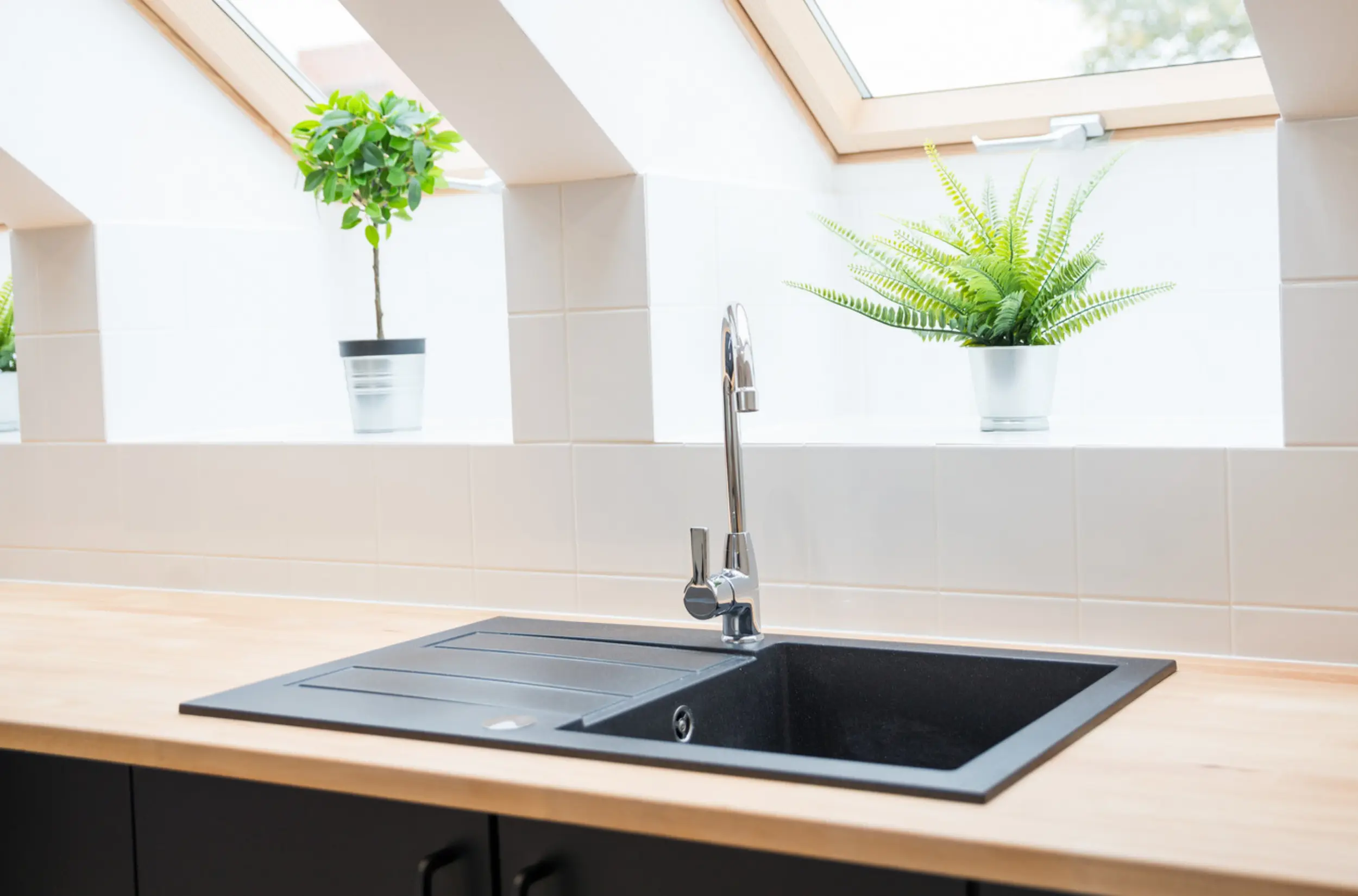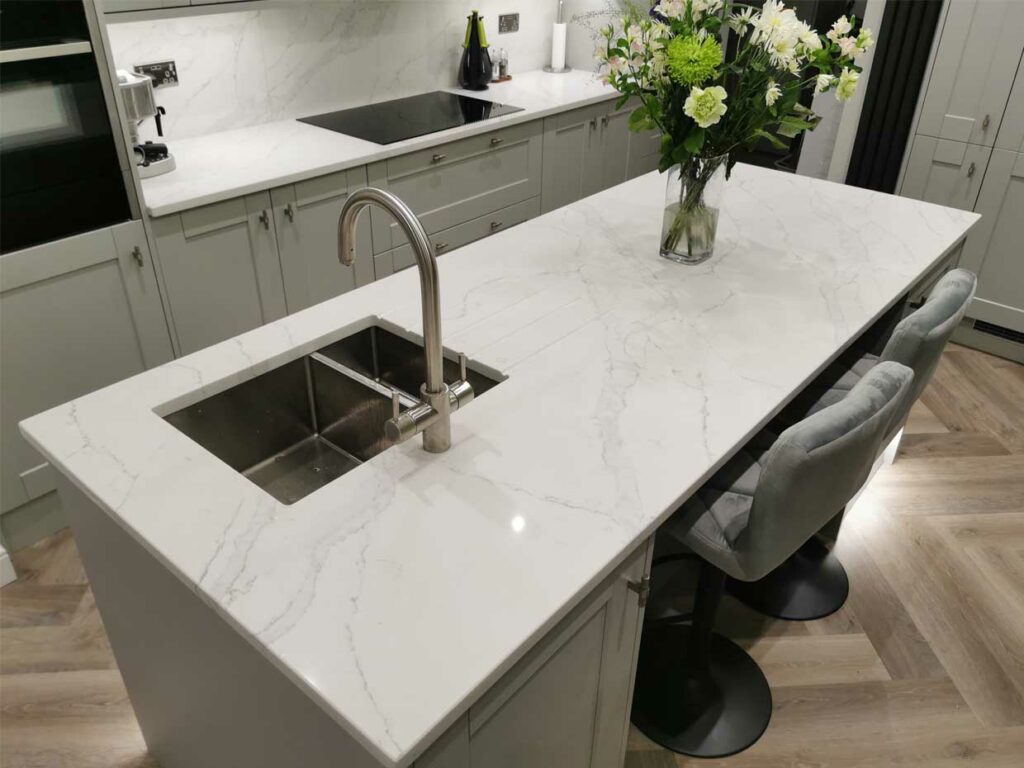With so many options for kitchen sink materials these days, it can be tricky to know which is truly the best choice for your home and lifestyle.
This article breaks down the pros and cons of some of the most popular materials to help you make an informed decision.
What Is the Best Kitchen Sink Material?
Stainless steel is the best material for a kitchen sink.
It is affordable, durable, resistant to stains and scratches, and easy to keep clean.
Stainless steel comes in various types to suit any kitchen decor.
It is a top choice for its versatility, longevity, and value.
Key Points
- Stainless steel is durable, stain-resistant, and affordable
- Granite is a high-end material that is heat and dent-resistant
- Smooth materials like stainless steel are the easiest to keep clean
Our Opinion
In my opinion as a kitchen design expert, stainless steel is the best material for most kitchen sinks.
It has an excellent balance of affordability, durability, and ease of maintenance.
Stainless steel sinks should last for many years with proper care.
Granite can also be a good option for some luxury kitchens but is less versatile.
For most homes, a high-quality stainless-steel sink is my top recommendation.
Stainless Steel Sinks: Pros and Cons
Stainless steel is one of the most common materials for kitchen sinks. It offers several benefits:
- Stainless steel is very durable and long-lasting. It is resistant to scratches, stains, and dents.
- It is easy to clean and maintain. You can use harsh cleaners without worrying about damaging the sink.
- Stainless steel comes in various types like 18/10 or 18/8, indicating the percentages of chromium and nickel. Higher percentages mean more corrosion resistance.
- It has a modern, sleek look that matches most kitchen designs and styles.
- Stainless steel sinks are typically more affordable than other sink materials.
Potential downsides of stainless steel include:
- It can be noisy – water and dishes clanging around can create loud noises.
- Stainless steel shows water spots and smudges more visibly unless you diligently wipe it after each use.
- Over time, stainless steel sinks may develop stains and rust if not properly cared for.
Overall, stainless steel is a versatile, durable, and budget-friendly sink material for most kitchens. With proper care, a stainless steel sink can last for decades.
Granite Composite Sinks: Pros and Cons
Granite composite sinks offer the look of natural stone with the durability of acrylic resins. Here’s an overview of their advantages and potential drawbacks:
- Made from crushed granite mixed with acrylic resins, they are highly durable and resistant to scratches, stains, and heat.
- They come in various colours like black, brown, grey, and white, allowing you to match your kitchen decor.
- Composite granite is less prone to chipping and cracking compared to real granite.
- These sinks are easy to clean and maintain – just use mild soap and water.
- They tend to be more expensive than stainless steel sinks.
- The resins can lose their lustre and start to fade over time with heavy use.
- Granite composite is not completely impervious to scratches and stains despite its durability.
In summary, granite composite sinks offer the visual appeal of real stone with excellent durability. Just be prepared to pay more compared to stainless steel.
Ceramic Sinks: Pros and Cons
Moving on to ceramic sinks – offer a sleek, modern look in various colours and styles.
- Ceramic is very durable and resistant to scratches, stains, and high temperatures.
- Glazed ceramic is easy to clean and maintain with just soap and water.
- Ceramic comes in many styles – single bowl, double bowl, even with integrated drainboards.
- The variety of colours and finishes allows you to coordinate with your kitchen decor.
- On the downside, ceramic can chip or crack if subjected to hard impacts.
- Unglazed ceramic is more prone to staining and needs to be sealed regularly.
- Ceramic sinks tend to be heavier than other sink materials.
Ceramics certainly brings visual appeal and durability to the kitchen. Just be gentle with it to avoid chipping and cracking over time.
Cast Iron Sinks: Pros and Cons
Moving on to cast iron sinks – these are known for their ruggedness and vintage appeal.
- Cast iron is extremely durable and can last 50 years or more with proper care.
- Enameled cast iron resists scratches, stains, and rust.
- Cast iron maintains heat well and is ideal for tasks like filling stock pots.
- Vintage-style cast iron sinks are available to match cottage or farmhouse decors.
- On the downside, bare cast iron requires frequent re-sealing to prevent rust.
- Cast iron is very heavy, making installation more complex.
- Enamel can chip or crack if subjected to hard impacts.
Cast iron is a solid choice if you want a sturdy, vintage-looking sink and don’t mind the extra weight.
Composite Sinks: Pros and Cons
Moving on to composite sinks, which blend materials like crushed stone and acrylic resins.
- Composite sinks are affordable, usually costing less than stainless steel.
- They come in a wide range of colours like black, beige, and grey to complement any kitchen.
- Composite is lighter than materials like cast iron, simplifying installation.
- The acrylic resin surface resists scratches, stains, and dents.
- On the negative side, composites aren’t as durable as stone or stainless steel.
- The surface can become damaged over time by heavy impacts.
- Composite tends to show water spots and stains more than other sink materials.
Composite sinks offer an inexpensive way to add a pop of colour to your kitchen, just don’t expect the durability of pricier materials.
FAQ
What’s the most durable material for a kitchen sink?
Stainless steel is one of the most durable materials for kitchen sinks. It is resistant to stains, scratches, and heat. Stainless steel sinks are very long-lasting.
What kind of kitchen sink is easiest to keep clean?
Smooth, non-porous materials like stainless steel and enamel are the easiest kitchen sink materials to keep clean. They resist staining and buildup. Their smooth surfaces make cleaning simple.
What is the best material for a kitchen sink in the UK?
In the UK, stainless steel is one of the most popular kitchen sink materials. It is affordable, durable, and easy to keep clean. Stainless steel comes in various styles to suit any kitchen.
What is the best kitchen sink that won’t stain?
Stainless steel kitchen sinks are resistant to stains and are among the best options that don’t stain easily. Enamel and granite sinks also resist staining well. Regular cleaning helps prevent stains on any sink material.
Conclusion
Stainless steel and granite are excellent kitchen sink materials that are durable, stain-resistant, and easy to clean. Stainless steel is an affordable option that comes in various styles. Granite is a high-end material that is heat and dent-resistant. For durability and stain resistance, stainless steel or granite are great choices for kitchen sinks. The best material depends on your needs and budget. Overall, stainless steel is a top choice for most kitchens.


